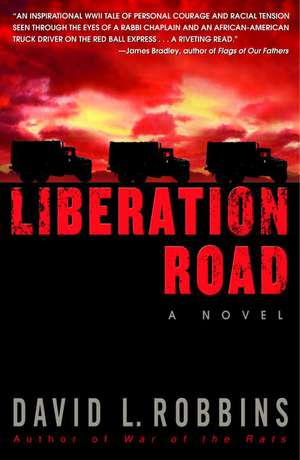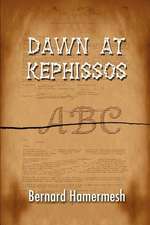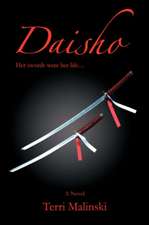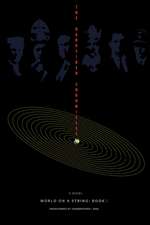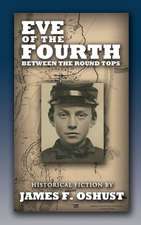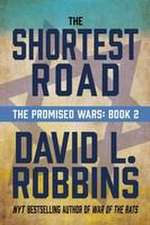Liberation Road: A Novel of World War II and the Red Ball Express
Autor David L. Robbinsen Limba Engleză Paperback – 30 sep 2005
June 1944. The Allies deliver a staggering blow to Hitler’s Atlantic fortress, leaving the beaches and bluffs of Normandy strewn with corpses. The Germans have only one chance to stop the immense invasion–by bottling up the Americans on the Cotentin Peninsula. There, in fields crisscrossed with dense hedgerows, many will meet their death while others will search for signs of life. Among the latter are two very different men, each with his own demons to fight and his own reasons to risk his life for his fellow man.
Joe Amos Biggs is an invisible “colored” driver in the Red Ball Express, the unheralded convoy of trucks that serves as a precious lifeline to the front. Delivering fuel and ammunition to men whose survival depends on the truckers, Joe Amos finds himself hungering to make his mark and propelled into battle among those who don’t see him as an equal–but will need him to be a hero.
A chaplain in the demoralized 90th Infantry, Rabbi Ben Kahn is a veteran of the first great war and old enough to be the father of the GIs he tends. Searching for the truth about his own son, a downed pilot missing in action, Kahn finds himself dueling with God, wading into combat without a gun, and becoming a leader among men in need of someone–anyone–to follow.
The prize: the liberation of Paris, where a ruthless American traitor known as Chien Blanc–White Dog–grows fat and rich in the black market. Whatever the occupied city’s destiny, destroyed or freed, he will win.
The fates of these three men will collide, hurtling toward an uncommon destiny in which people commit deeds they cannot foresee and can never truly explain.
From the screams of German .88 howitzers to the last whispers of dying young soldiers, Robbins captures war in all its awful fullness. And through the eyes of his unique characters, he leaves us with a mature, brilliant, and memorable vision of humanity in the face of inhumanity itself.
From the Hardcover edition.
Preț: 118.19 lei
Nou
Puncte Express: 177
Preț estimativ în valută:
22.62€ • 23.53$ • 18.67£
22.62€ • 23.53$ • 18.67£
Carte disponibilă
Livrare economică 24 martie-07 aprilie
Preluare comenzi: 021 569.72.76
Specificații
ISBN-13: 9780553381757
ISBN-10: 055338175X
Pagini: 445
Dimensiuni: 158 x 233 x 26 mm
Greutate: 0.49 kg
Editura: Bantam Books
ISBN-10: 055338175X
Pagini: 445
Dimensiuni: 158 x 233 x 26 mm
Greutate: 0.49 kg
Editura: Bantam Books
Notă biografică
DAVID L. ROBBINS is the author of War of the Rats, The End of War, Scorched Earth, and Last Citadel. A former attorney, he lives in Richmond, Virginia, where he is at work on his next historical thriller.
From the Hardcover edition.
From the Hardcover edition.
Extras
september 15, 1944
The search for his son stopped here.
Ben Kahn toted up the sum of the young man standing in front of him. Well fed in a starving city. White-skinned and clean where millions lived without soap. Clothes expensive and dark. The long occupation, the fight for Paris, a nation's hunger--none of it had marked him. He'd flourished.
Ben waited while black eyes added him up, as well.
The boy shrugged. "You got me all wrong, Pop."
"Don't call me Pop." Ben winced. A pain in his side threatened to rip open. He put a hand there to hold it in.
"S'matter?" the boy asked. "You got no stomach for business? That's all it ever was--business. Everybody did it. Get serious."
Ben felt unsteady. He reached for a tabletop to catch himself.
His son had been a pilot. That was honorable. A year and a half ago he was shot down over France.
The crash didn't kill him. Paris killed him. Paris murdered everything honorable and good about his son, and he in turn killed others. Ben stared at the monster, traitor, in front of him and thought, My son became . . . this.
The room was a big space, a garage hung with chains and grimy tools, metal rafters and water pipes. A Citro‘n waited under a jacket of dust; for four years no one had worked on civilian cars in Paris, with little gas to run them. The walls of the building were thick, the street outside was a quiet alley. The thoroughfares beyond were still flush with the Liberation. No one was looking for this young man. He was missing. Presumed dead.
"So, Pop. What are we gonna do? I can't stand here all day chattin' about old times. You don't look like you want to, either."
Ben did not correct him for calling him Pop.
He reached under his olive jacket. He hauled the .45 pistol from his waistband. The gun filled his hand and lifted his arm. Ben felt as though he could let go and the pistol would stay in the air, hammer cocked.
"What are you gonna do, shoot me?"
Untold deaths had passed through Ben's hands.
"Yes."
Ben stared at the white face turned incredulous, cringing. This was a coward, too. Of course he was.
"You can't do that!"
"Yes I can." Ben's voice was cool.
"No, no, no. You're . . . you're a man of God."
Ben answered down the barrel.
"Not anymore."
REVERSE
FIRST
Logistics were the lifeblood of the Allied Armies in France without supplies, we could not move, shoot, eat.
General Omar Bradley
A General's Life
june 11, 1944
The first body of the second war in Ben Kahn's life drifted past.
The corpse bobbed on a thieving wave, a little salty crest that snuck onto the beach and floated away the soldier beneath anyone's notice. The water tried to ferret its catch back out to sea, a quiet and greedy bier. A cotton mattress cover had been buttoned around the corpse in its wait for burial somewhere close to this beach. Soaked, the sheath matted to its knees, shoulders, boot tips, even the nose and hollows of eyes.
He leaned over the rail of the truck bed, where he rode to shore. The truck, a deuce-and-a-half in an armada of vehicles, churned through the long shallows of the Norman coast, making for the beach. Colored boys drove all the trucks. Ben Kahn looked through the rear window at the two black boys in the cab of his truck. Both craned their necks to see the corpse bob off the right fender. Ben scooted across crates of ammunition to the tailgate of the truck. The water here off OMAHA should not want more, he thought. How red has it been already? He jumped into the water, hip deep. The truck stopped at his splash.
The driver shouted, "Hey, you alright?"
"Yeah. Figure I'd fetch this fella back to shore. You two go ahead. Thanks for the lift."
The driver nodded, said something to his assistant, and pulled away. Ben waded to the body, grabbing the mattress cover. The tug of the Channel seemed jealous. Ben pulled against it and plowed forward to the beach.
The walk was long, almost two hundred yards to the low-tide shelf. The body stayed buoyant behind him. Ben imagined how bloated it must be to float like it did. He towed the corpse in its white sack past obstacles the Germans had hammered into the sand. Allied engineers had been hard at work here, clearing paths for the constant invasion. Ben and his dead soldier passed steel tetrahedrons that would gut any boat floating across them at high tide, Belgian gates eight feet high laced with teller mines, barbed-wire lattices, and fat poles jutting in pyramids clotted with barnacles. The hulks of burned, stove-in landing craft, each a fiery story to itself, made the surface of the water jagged. Left and right Ben looked dragging the body, now in shallower water dragging its own heels as if saddened like Ben to return to France.
A medic jogged into the skim of water to help lug the corpse onto dry sand. Together, the two pulled the soldier back to where the wave had stolen him at a Graves Registration detail. Ben let go the mattress cover once the soldier lay again in a neat line, one white picket in a long, knocked-down fence.
Ben's boots sloshed, his pantaloons drizzled. The medic left him with a nod. Ben did not know what to do or where to go; he was four days late reaching OMAHA beach. Activity welled everywhere. As a soldier, as the father of a son missing in action, all of it was his concern. This dizzied him, joining the fatigue of dragging the corpse ashore. Ben sat on the sand and gazed at America's arrival.
Landing craft towing barrage balloons ran themselves aground to disgorge machines, men, and materiel. Offshore, Navy ships prowled. Frequently, one of them let go a salvo at some target a mile inland. Each report rattled everything on the beach. An entire division, fifteen thousand men with rifles and machine guns slung over every shoulder, trudged through the shallow water. None of the men paused on the beach, all drudged up the slopes of the high dunes where the Germans had been, away to the front line. Tanks and towed artillery filled the parade, making their separate way to the draw between the bluffs. Working the water behind the landing craft, dozens of tugboats wrestled pieces of the huge artificial harbor called "Mulberry" into place. Fifty-gallon drums were rolled together by the hundreds to make instant depots. Trucks backed and spit forward, loaded to the gills.
Ben Kahn looked at the one thing he'd done so far since arriving in France, the body in its wet cocoon he'd retrieved. He unbuttoned the mattress cover to reveal the soldier's face. A boy, a brown-haired boy. Ben fingered for the remaining dog tag under the tunic and read a name, a blood type, Catholic. Ben could not guess how this soldier died, if he might have had a last moment to spend with a priest or if he was taken too fast.
He laid a hand on the cold, pallid forehead.
"Hail Mary, full of grace. The Lord is with Thee. Blessed art Thou among women and blessed is the fruit of Thy womb, Jesus. Holy Mary, Mother of God, pray for us sinners, now and at the hour of our death."
With his thumb, Ben drew the sign of the cross.
"Amen."
He lifted his gaze. He'd known for more than a year he would do this as soon as he landed in France.
He knew, too, that it would be fruitless. Ben Kahn cast his eyes across the beach, at the slogging thousands of American doughs, wondering if he might spot a lost face, a gait, something. He would do this the rest of his life--keep looking--until he was certain.
Rabbi Ben Kahn buttoned the sheath over the dead boy's face and stood, at war.
"Damn!"
Joe Amos slid across the bench seat until his rear collided with Boogie John's leg. The big driver shoved him away.
"Get off me, boy!"
"Damn, you see that?" Joe Amos was slow to ease back to his passenger-side window. Boogie John leaned right to look for himself.
"That's a dead man, sure enough."
Joe Amos nodded. He set his elbows on the window frame. The corpse floated just below, bagged in a white cotton cover.
"You ain't never seen no dead man before, huh?"
Joe Amos shook his head, longer than just to say no. He watched the outgoing tide take the body into the Channel and wondered if it would get all the way to England. That boy wants to go home, Joe Amos thought.
With a splash, the chaplain riding in the truck bed jumped down. Boogie John hit the brakes. Joe
Amos leaned out farther to see behind the truck. The water stood above the Jimmy's tires and running boards and came to the chaplain's belt. One minute the chaplain had been riding high and dry, now he was sopping wet. Good for him, Joe Amos thought. And this wasn't no young man, this chaplain, this was a skinny sharp-nosed type, wiry, some kind of roadrunner. Back on the LCM, when he asked for a ride into shore, Joe Amos saw he was a Jew. The chaplain had a little Ten Commandments badge on his collar with his captain's bars. The chaplain kicked through the water to the floating body.
"Thank you, Jesus," Joe Amos mumbled.
Boogie John leaned out his driver's window.
"Chaplain, you alright?"
The man answered he was going to fetch the body back to the beach. Boogie John waved to the chaplain and said to Joe Amos, "Let's go." Boogie got the Jimmy moving, shoving up to second gear to close the gap in their convoy through the water. Joe Amos brought his gaze forward. The first dead man he'd ever seen was wrapped in white. It was bad but got easier to look at. He knew there'd be dead men, and was grateful to get the first one out of the way like that, better than he'd imagined. Something started when that corpse floated by. Joe Amos looked at Boogie John, the closest living man to him. He reached for Boogie's shoulder and left his hand on it.
"Here we go."
The truck surged forward. The water took a long time to grow shallow, the beach was far off and misty. Boogie closed up on the bumper of the truck ahead of him. Joe Amos twisted in his seat to see everything, gandering at the enemy obstacles strewn like a million jacks as far as he could look to the west, all the way to Pointe du Hoc. Sunken transports, sleek back in England when they were defiant and full of white boys with guns and tanks, were like craters in the water. Boogie told Joe Amos to sit still, but his view was blocked by the truck in front, the ammo crates behind, and Boogie's big face to the left.
When the Jimmy finally pulled onto the sand, the convoy turned left. An MP windmilled one arm to direct them to a gathering station for their battalion. Joe Amos opened his door. He climbed out on the running board to get a better view of the invasion force streaming ashore. An uncountable number of boats plied back and forth in the Channel. Big Navy ships patrolled the outer limits, rhino ferries and DUKWs hauled supplies and vehicles up to the beach. Trucks, tanks, and bulldozers came out of the water dripping like summer dogs. Activity buzzed for miles down the beach. Joe Amos figured the Brits were doing the same farther east, where their zone was.
I'm in France, Joe Amos thought. Damn a mule, France.
"Look at that, Boog!" he shouted over the din of the diesels around him. Three huge roadways spanned from the sand out to a chain of concrete piers sunk a thousand yards offshore. Engineers swarmed over them, securing the last pieces of the bridges to pontoons. "They get that done, won't be no more driving through the water!"
"Nope," Boogie answered.
Joe Amos hung on and gazed over the canvas roof of the rolling Jimmy's cab. Offshore, east of the piers, a string of Liberty ships and tankers had been sunk five hundred yards out from OMAHA to make a breakwater. The blockships lay in a row so tight they almost touched bow to stern. "Well, I'll be," Joe Amos mumbled, impressed. America, all this, so many ships we can sink them on purpose. He swelled with his America.
Boogie drove alongside the cliffs in line with the rest of the truck battalion. Their first assigned stop was a maintenance area where they would strip the hoses from the carburetor and exhaust and unpack the waterproof cosmoline grease from the wires and plugs that allowed the GMC truck to drive through the water. On the slopes of the bluffs, thousands of GIs had dug foxholes, an odd honeycomb, a sort of Yank infestation. None of the soldiers lifted their faces to greet the convoy, they smoked or slept. Over their heads, crowning the bluffs, two pillboxes stood guard no more. The Germans had called this their Atlantic Wall. Shoot, Joe Amos thought. Now those bunkers are just broken concrete, black-eyed and hollow, shut up and done in by these guys curled in their holes in the sand. Joe Amos made a fist and shook it at one soldier whose drawn eye he caught. The man nodded back, a dent in his helmet. The pillboxes were payback for that dent and for the busted landing craft in the water, too, for the white-wrapped, floating body, and for Joe Amos Biggs and all of them being over here in France, and paybacks were hell.
"We're gonna get off this beach!" he cheered. "We're gonna kick their whole ass! What you think?"
Boogie struck out his flat hand for some skin. Joe Amos reached in the window and smoothed his palm across Boogie's.
"Boy!"
Joe Amos looked out the windshield. Boogie slowed the Jimmy to let an MP stride in front of the high grille.
"You! Boy! Get your fanny back in that truck."
Joe Amos straightened on the running board. He fumbled for the door latch.
"Yeah, okay."
The MP banged the butt of his rifle against the passing front fender.
"Now, boy."
Joe Amos climbed on the bench beside Boogie. The driver's big smile was gone.
"Son of a bitch."
"Leave it, Boog."
Boogie sped the truck past the glaring MP, then pulled one hand from the wheel, the hand that a moment ago was offered to Joe Amos open and pink. Now one finger stabbed close to Joe Amos's eyes.
From the Hardcover edition.
The search for his son stopped here.
Ben Kahn toted up the sum of the young man standing in front of him. Well fed in a starving city. White-skinned and clean where millions lived without soap. Clothes expensive and dark. The long occupation, the fight for Paris, a nation's hunger--none of it had marked him. He'd flourished.
Ben waited while black eyes added him up, as well.
The boy shrugged. "You got me all wrong, Pop."
"Don't call me Pop." Ben winced. A pain in his side threatened to rip open. He put a hand there to hold it in.
"S'matter?" the boy asked. "You got no stomach for business? That's all it ever was--business. Everybody did it. Get serious."
Ben felt unsteady. He reached for a tabletop to catch himself.
His son had been a pilot. That was honorable. A year and a half ago he was shot down over France.
The crash didn't kill him. Paris killed him. Paris murdered everything honorable and good about his son, and he in turn killed others. Ben stared at the monster, traitor, in front of him and thought, My son became . . . this.
The room was a big space, a garage hung with chains and grimy tools, metal rafters and water pipes. A Citro‘n waited under a jacket of dust; for four years no one had worked on civilian cars in Paris, with little gas to run them. The walls of the building were thick, the street outside was a quiet alley. The thoroughfares beyond were still flush with the Liberation. No one was looking for this young man. He was missing. Presumed dead.
"So, Pop. What are we gonna do? I can't stand here all day chattin' about old times. You don't look like you want to, either."
Ben did not correct him for calling him Pop.
He reached under his olive jacket. He hauled the .45 pistol from his waistband. The gun filled his hand and lifted his arm. Ben felt as though he could let go and the pistol would stay in the air, hammer cocked.
"What are you gonna do, shoot me?"
Untold deaths had passed through Ben's hands.
"Yes."
Ben stared at the white face turned incredulous, cringing. This was a coward, too. Of course he was.
"You can't do that!"
"Yes I can." Ben's voice was cool.
"No, no, no. You're . . . you're a man of God."
Ben answered down the barrel.
"Not anymore."
REVERSE
FIRST
Logistics were the lifeblood of the Allied Armies in France without supplies, we could not move, shoot, eat.
General Omar Bradley
A General's Life
june 11, 1944
The first body of the second war in Ben Kahn's life drifted past.
The corpse bobbed on a thieving wave, a little salty crest that snuck onto the beach and floated away the soldier beneath anyone's notice. The water tried to ferret its catch back out to sea, a quiet and greedy bier. A cotton mattress cover had been buttoned around the corpse in its wait for burial somewhere close to this beach. Soaked, the sheath matted to its knees, shoulders, boot tips, even the nose and hollows of eyes.
He leaned over the rail of the truck bed, where he rode to shore. The truck, a deuce-and-a-half in an armada of vehicles, churned through the long shallows of the Norman coast, making for the beach. Colored boys drove all the trucks. Ben Kahn looked through the rear window at the two black boys in the cab of his truck. Both craned their necks to see the corpse bob off the right fender. Ben scooted across crates of ammunition to the tailgate of the truck. The water here off OMAHA should not want more, he thought. How red has it been already? He jumped into the water, hip deep. The truck stopped at his splash.
The driver shouted, "Hey, you alright?"
"Yeah. Figure I'd fetch this fella back to shore. You two go ahead. Thanks for the lift."
The driver nodded, said something to his assistant, and pulled away. Ben waded to the body, grabbing the mattress cover. The tug of the Channel seemed jealous. Ben pulled against it and plowed forward to the beach.
The walk was long, almost two hundred yards to the low-tide shelf. The body stayed buoyant behind him. Ben imagined how bloated it must be to float like it did. He towed the corpse in its white sack past obstacles the Germans had hammered into the sand. Allied engineers had been hard at work here, clearing paths for the constant invasion. Ben and his dead soldier passed steel tetrahedrons that would gut any boat floating across them at high tide, Belgian gates eight feet high laced with teller mines, barbed-wire lattices, and fat poles jutting in pyramids clotted with barnacles. The hulks of burned, stove-in landing craft, each a fiery story to itself, made the surface of the water jagged. Left and right Ben looked dragging the body, now in shallower water dragging its own heels as if saddened like Ben to return to France.
A medic jogged into the skim of water to help lug the corpse onto dry sand. Together, the two pulled the soldier back to where the wave had stolen him at a Graves Registration detail. Ben let go the mattress cover once the soldier lay again in a neat line, one white picket in a long, knocked-down fence.
Ben's boots sloshed, his pantaloons drizzled. The medic left him with a nod. Ben did not know what to do or where to go; he was four days late reaching OMAHA beach. Activity welled everywhere. As a soldier, as the father of a son missing in action, all of it was his concern. This dizzied him, joining the fatigue of dragging the corpse ashore. Ben sat on the sand and gazed at America's arrival.
Landing craft towing barrage balloons ran themselves aground to disgorge machines, men, and materiel. Offshore, Navy ships prowled. Frequently, one of them let go a salvo at some target a mile inland. Each report rattled everything on the beach. An entire division, fifteen thousand men with rifles and machine guns slung over every shoulder, trudged through the shallow water. None of the men paused on the beach, all drudged up the slopes of the high dunes where the Germans had been, away to the front line. Tanks and towed artillery filled the parade, making their separate way to the draw between the bluffs. Working the water behind the landing craft, dozens of tugboats wrestled pieces of the huge artificial harbor called "Mulberry" into place. Fifty-gallon drums were rolled together by the hundreds to make instant depots. Trucks backed and spit forward, loaded to the gills.
Ben Kahn looked at the one thing he'd done so far since arriving in France, the body in its wet cocoon he'd retrieved. He unbuttoned the mattress cover to reveal the soldier's face. A boy, a brown-haired boy. Ben fingered for the remaining dog tag under the tunic and read a name, a blood type, Catholic. Ben could not guess how this soldier died, if he might have had a last moment to spend with a priest or if he was taken too fast.
He laid a hand on the cold, pallid forehead.
"Hail Mary, full of grace. The Lord is with Thee. Blessed art Thou among women and blessed is the fruit of Thy womb, Jesus. Holy Mary, Mother of God, pray for us sinners, now and at the hour of our death."
With his thumb, Ben drew the sign of the cross.
"Amen."
He lifted his gaze. He'd known for more than a year he would do this as soon as he landed in France.
He knew, too, that it would be fruitless. Ben Kahn cast his eyes across the beach, at the slogging thousands of American doughs, wondering if he might spot a lost face, a gait, something. He would do this the rest of his life--keep looking--until he was certain.
Rabbi Ben Kahn buttoned the sheath over the dead boy's face and stood, at war.
"Damn!"
Joe Amos slid across the bench seat until his rear collided with Boogie John's leg. The big driver shoved him away.
"Get off me, boy!"
"Damn, you see that?" Joe Amos was slow to ease back to his passenger-side window. Boogie John leaned right to look for himself.
"That's a dead man, sure enough."
Joe Amos nodded. He set his elbows on the window frame. The corpse floated just below, bagged in a white cotton cover.
"You ain't never seen no dead man before, huh?"
Joe Amos shook his head, longer than just to say no. He watched the outgoing tide take the body into the Channel and wondered if it would get all the way to England. That boy wants to go home, Joe Amos thought.
With a splash, the chaplain riding in the truck bed jumped down. Boogie John hit the brakes. Joe
Amos leaned out farther to see behind the truck. The water stood above the Jimmy's tires and running boards and came to the chaplain's belt. One minute the chaplain had been riding high and dry, now he was sopping wet. Good for him, Joe Amos thought. And this wasn't no young man, this chaplain, this was a skinny sharp-nosed type, wiry, some kind of roadrunner. Back on the LCM, when he asked for a ride into shore, Joe Amos saw he was a Jew. The chaplain had a little Ten Commandments badge on his collar with his captain's bars. The chaplain kicked through the water to the floating body.
"Thank you, Jesus," Joe Amos mumbled.
Boogie John leaned out his driver's window.
"Chaplain, you alright?"
The man answered he was going to fetch the body back to the beach. Boogie John waved to the chaplain and said to Joe Amos, "Let's go." Boogie got the Jimmy moving, shoving up to second gear to close the gap in their convoy through the water. Joe Amos brought his gaze forward. The first dead man he'd ever seen was wrapped in white. It was bad but got easier to look at. He knew there'd be dead men, and was grateful to get the first one out of the way like that, better than he'd imagined. Something started when that corpse floated by. Joe Amos looked at Boogie John, the closest living man to him. He reached for Boogie's shoulder and left his hand on it.
"Here we go."
The truck surged forward. The water took a long time to grow shallow, the beach was far off and misty. Boogie closed up on the bumper of the truck ahead of him. Joe Amos twisted in his seat to see everything, gandering at the enemy obstacles strewn like a million jacks as far as he could look to the west, all the way to Pointe du Hoc. Sunken transports, sleek back in England when they were defiant and full of white boys with guns and tanks, were like craters in the water. Boogie told Joe Amos to sit still, but his view was blocked by the truck in front, the ammo crates behind, and Boogie's big face to the left.
When the Jimmy finally pulled onto the sand, the convoy turned left. An MP windmilled one arm to direct them to a gathering station for their battalion. Joe Amos opened his door. He climbed out on the running board to get a better view of the invasion force streaming ashore. An uncountable number of boats plied back and forth in the Channel. Big Navy ships patrolled the outer limits, rhino ferries and DUKWs hauled supplies and vehicles up to the beach. Trucks, tanks, and bulldozers came out of the water dripping like summer dogs. Activity buzzed for miles down the beach. Joe Amos figured the Brits were doing the same farther east, where their zone was.
I'm in France, Joe Amos thought. Damn a mule, France.
"Look at that, Boog!" he shouted over the din of the diesels around him. Three huge roadways spanned from the sand out to a chain of concrete piers sunk a thousand yards offshore. Engineers swarmed over them, securing the last pieces of the bridges to pontoons. "They get that done, won't be no more driving through the water!"
"Nope," Boogie answered.
Joe Amos hung on and gazed over the canvas roof of the rolling Jimmy's cab. Offshore, east of the piers, a string of Liberty ships and tankers had been sunk five hundred yards out from OMAHA to make a breakwater. The blockships lay in a row so tight they almost touched bow to stern. "Well, I'll be," Joe Amos mumbled, impressed. America, all this, so many ships we can sink them on purpose. He swelled with his America.
Boogie drove alongside the cliffs in line with the rest of the truck battalion. Their first assigned stop was a maintenance area where they would strip the hoses from the carburetor and exhaust and unpack the waterproof cosmoline grease from the wires and plugs that allowed the GMC truck to drive through the water. On the slopes of the bluffs, thousands of GIs had dug foxholes, an odd honeycomb, a sort of Yank infestation. None of the soldiers lifted their faces to greet the convoy, they smoked or slept. Over their heads, crowning the bluffs, two pillboxes stood guard no more. The Germans had called this their Atlantic Wall. Shoot, Joe Amos thought. Now those bunkers are just broken concrete, black-eyed and hollow, shut up and done in by these guys curled in their holes in the sand. Joe Amos made a fist and shook it at one soldier whose drawn eye he caught. The man nodded back, a dent in his helmet. The pillboxes were payback for that dent and for the busted landing craft in the water, too, for the white-wrapped, floating body, and for Joe Amos Biggs and all of them being over here in France, and paybacks were hell.
"We're gonna get off this beach!" he cheered. "We're gonna kick their whole ass! What you think?"
Boogie struck out his flat hand for some skin. Joe Amos reached in the window and smoothed his palm across Boogie's.
"Boy!"
Joe Amos looked out the windshield. Boogie slowed the Jimmy to let an MP stride in front of the high grille.
"You! Boy! Get your fanny back in that truck."
Joe Amos straightened on the running board. He fumbled for the door latch.
"Yeah, okay."
The MP banged the butt of his rifle against the passing front fender.
"Now, boy."
Joe Amos climbed on the bench beside Boogie. The driver's big smile was gone.
"Son of a bitch."
"Leave it, Boog."
Boogie sped the truck past the glaring MP, then pulled one hand from the wheel, the hand that a moment ago was offered to Joe Amos open and pink. Now one finger stabbed close to Joe Amos's eyes.
From the Hardcover edition.
Recenzii
"Robbins--emerging as the Homer of WWII--re-creates the mighty drama in all its deadly beauty."
--Kirkus Reviews, starred review
"David Robbins has done it again. In LIBERATION ROAD, he presents an inspirational WWII tale of personal courage and racial tension through the eyes of a rabbi chaplain and an African-American truck driver on the Red Ball Express--the twenty three thousand men manning the six thousand trucks that transported the beans and bullets needed to defeat Germany. A riveting read."
--James Bradley, author of Flags of Our Fathers & Flyboys
"Powerful... a compelling tale of the final days of the most catastrophic event in tall of recorded history."
--Washington Post on The End of War
"Deeply-felt. Robbins renders his real people superbly but the heart of his story is his imagined cast. Brilliant storytelling by an author in absolute control of his material."
--Kirkus Reviews (starred review) on The End of War
From the Hardcover edition.
--Kirkus Reviews, starred review
"David Robbins has done it again. In LIBERATION ROAD, he presents an inspirational WWII tale of personal courage and racial tension through the eyes of a rabbi chaplain and an African-American truck driver on the Red Ball Express--the twenty three thousand men manning the six thousand trucks that transported the beans and bullets needed to defeat Germany. A riveting read."
--James Bradley, author of Flags of Our Fathers & Flyboys
"Powerful... a compelling tale of the final days of the most catastrophic event in tall of recorded history."
--Washington Post on The End of War
"Deeply-felt. Robbins renders his real people superbly but the heart of his story is his imagined cast. Brilliant storytelling by an author in absolute control of his material."
--Kirkus Reviews (starred review) on The End of War
From the Hardcover edition.
